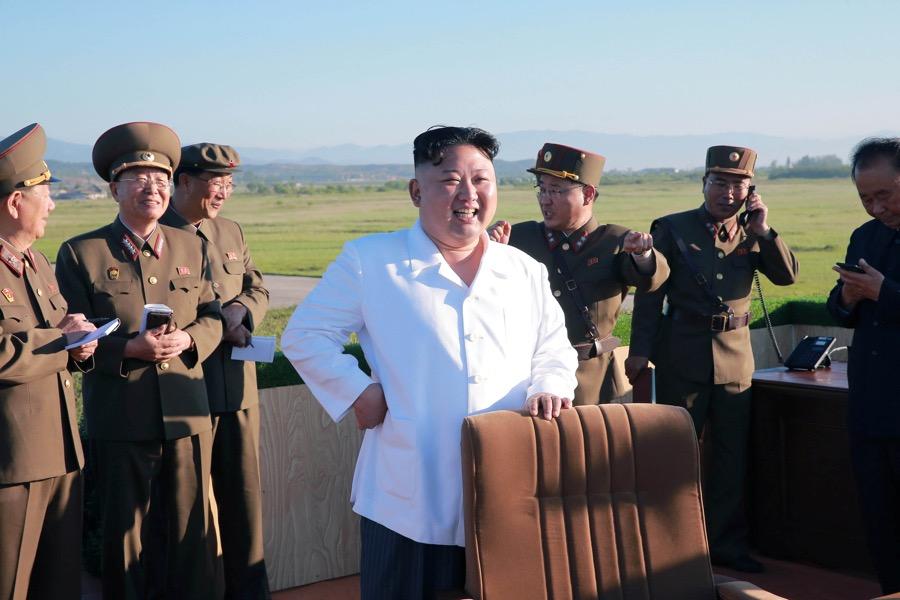North Korea has fired a short-range ballistic missile
North Korean leader Kim Jong-un watching the test of an anti-aircraft guided weapon system in an undated photo released by North Korea's Korean Central News Agency on May 28.
The United States confirmed Sunday that North Korea has test-launched another ballistic missile, a move that ratchets up tensions over the North's quest to develop weapons capable of hitting the US.
The US Pacific Command said the short-range missile, launched from near Wonsan Airfield, was tracked for six minutes until it landed in the Sea of Japan.
News of the launch comes as US President Donald Trump seeks tougher sanctions against the isolated nuclear-armed regime, which is on a quest to develop a missile capable of reaching the continental United States.
The test is the latest launch by Pyongyang this year as the isolated regime steps up efforts to develop an intercontinental ballistic missile that can deliver a nuclear warhead to the continental United States.
The missile launches, and Pyongyang's threat to stage its sixth nuclear test, have prompted calls for tougher UN sanctions and a warning from US President Donald Trump that military intervention was an option under consideration.
Japan's chief cabinet secretary, Yoshihide Suga, told reporters the missile appeared to have fallen into the country's Exclusive Economic Zone (EEZ) — waters extending 200 nautical miles from its coast.
"Our country can never tolerate repeated provocative actions by North Korea," he said, condemning the launch.
The regime has carried out two atomic tests and dozens of missile launches since the beginning of last year, with multiple sets of UN sanctions failing to halt its weapons push.
In Washington, a National Security Council spokesman said President Trump had been briefed on the launch.
South Korea's new president, Moon Jae-in, ordered a meeting of the national security council to assess the launch, the defence ministry said.
Following North Korea's test-firing of what analysts said was its longest-range rocket yet earlier this month, the UN Security Council vowed to push all countries to tighten sanctions against Pyongyang.
But China, the North's main trade partner and ally, has made it clear that the push for diplomatic talks — not imposing more sanctions — was the priority.
The United States has said it is willing to enter into talks with North Korea — but only if it halts its missile and nuclear tests.
North Korean leader Kim Jong-un has sought to ramp up the country's weapons program under his rule, saying the regime needs nuclear weapons to defend itself against the threat of invasion.
The Security Council adopted two sanctions resolutions last year to pile pressure on Pyongyang and deny the regime the hard currency needed to fund its military programs.
In all, six sets of sanctions have been imposed on North Korea since it first tested an atomic device in 2006.
Anti-aircraft weapon system test
Earlier on Sunday, North Korean state media said Kim oversaw a test of a new anti-aircraft weapon system.
Over the past few months, the young leader has overseen several military drills, including the test-firing of a medium-range ballistic missile last Sunday, as Washington seeks to ramp up pressure on Pyongyang to curb its nuclear ambitions.
The North's official Korean Central News Agency said Kim "watched the test of a new-type anti-aircraft guided weapon system," which was aimed at "detecting and striking different targets flying from any direction."
KCNA did not give the exact date and location of the drill. (The agency released a series of photos including the one at the top of this article.)
Pyongyang first tested the new weapon system in April last year when some defects had been discovered, but Kim said the latest test verified that all glitches had been "perfectly overcome," KCNA said.
The efficiency of the weapon system "to detect and track targets has remarkably improved and its hitting accuracy has also increased" compared to last year, the young leader was quoted as saying.
Expressing his satisfaction, Kim said: "[It] should be mass-produced to deploy in all over the country like forests so as to completely spoil the enemy's wild dream to command the air, boasting of air supremacy and weapon almighty."
